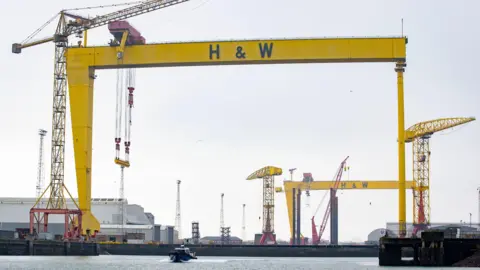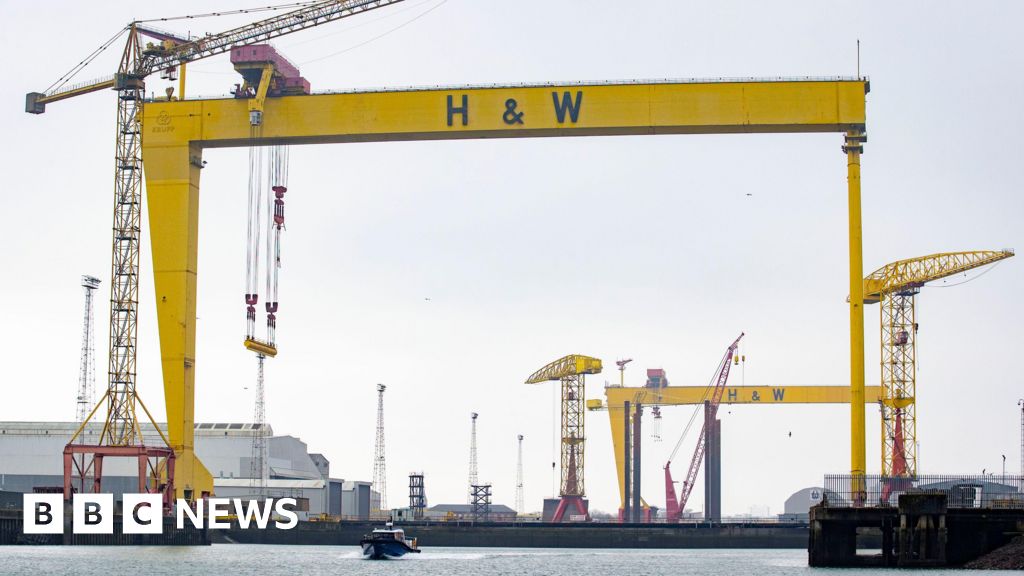PA MediaHarland and Wolff employs about 1,500 people, mainly in BelfastOffering financial support to Harland and Wolff meant "a very substantial risk
 PA Media
PA MediaOffering financial support to Harland and Wolff meant “a very substantial risk that taxpayer money would be lost”, the government has said.
The loss-making shipbuilder had applied for a loan guarantee of up to £200m.
It would have allowed the company to borrow money with the government acting as guarantor.
However, if the loans were to go bad the government would have had to step in to repay the lenders.
In a written statement the Business Secretary, Jonathan Reynolds, said: “This decision was based on a comprehensive assessment of the company’s financial profile and the criteria set out in our risk policies.
“We have also decided not to provide any form of emergency liquidity funding.
“The Government believes, in this instance, that the market is best placed to resolve the commercial matters faced by Harland and Wolff.”
‘Pragmatic solutions’
On Friday the company revealed its bid for state support had been unsuccessful and that its chief executive had left his job.
The company is now in talks with its lender, Riverstone, and is hopeful of agreeing additional funding within days.
Mr Reynolds said that in the government’s engagement with Riverstone the firm had “recognised the importance of the assets at Harland and Wolff as well as the people who work there, showing a desire to find pragmatic solutions that support government objectives.”
“I welcome potential new financing for Harland and Wolff and the appointment of new management and wish them all the best in their continued efforts to build up this business.”
There are still questions about Harland and Wolff’s long-term future.
The company’s shares are currently suspended after it failed to file audited accounts on time.
It has appointed Rothchilds bank to review strategic options which could include a sale of the business.
Its main operation is in Belfast and it has two smaller facilities in Scotland and one in England.
In 2023 it was part of a consortium which won a major contract to build three Royal Navy support ships.
The company has had to invest significantly to prepare for that work which has contributed to its large losses.
It had also taken on loans from Riverstone which charge a high rate of interest.
It had hoped to use a government guarantee to refinance those loans at a lower interest rate and take on more borrowing.
Mr Reynolds said Harland and Wolff remains “a key subcontractor” on the naval contract and the Ministry of Defence is “well engaged” with the prime contractor, Navantia, to monitor delivery of the project .
‘Worrying times’
Unite represents the majority of the workforce at the company.
Sharon Graham, from the union, said the workforce and the shipyards are of “critical strategic importance”.
“The political focus must now be on attracting stakeholders who are committed to building a long-term future, rather than those looking to turn a quick profit,” she said.
Meanwhile, Matt Roberts, from The GMB Union, said “these are worrying times for workers and their families.”
“These yards must be saved and their long-term sustainable future secured,” he added.
‘Government must show commitment to ship building’

East Belfast MP Gavin Robinson said there has been a “great deal of uncertainty” in the last number of weeks due to speculation that has arose over the loan guarantee.
“The government have chosen not to proceed with it on the basis for value for money,” he told BBC News NI’s Good Morning Ulster programme.
Mr Robinson said contracts, including a £1.6bn Ministry of Defence contract to build three Royal Navy support ships, puts the shipyard in a much more positive position than five years ago when it went into administration.
www.bbc.com

